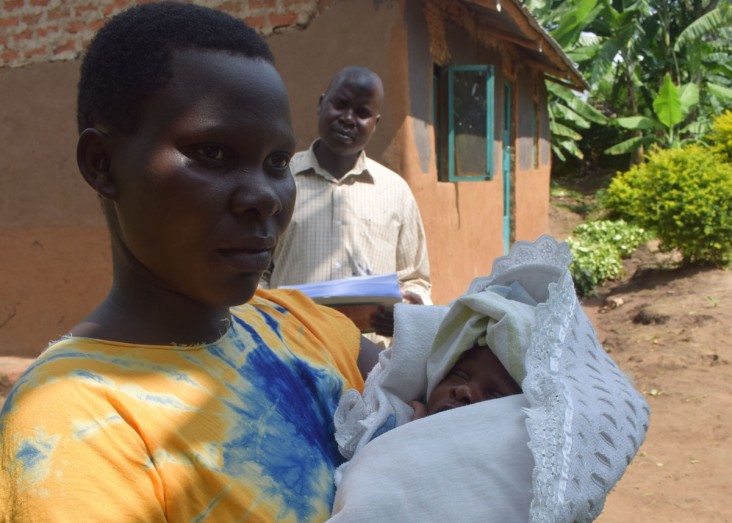Speeches Shim

Nasulu Webakila, the Local Council 1 Chairman of Nansasa village, Mbale District, is committed to ensuring that no woman or baby loses their life due to challenges in providing and accessing health services during the COVID-19 pandemic. The USAID Uganda Voucher Plus Activity engaged Nasulu to travel door-to-door visiting mothers in the program with information about safe deliveries, post-natal care, family planning and immunization in health facilities with qualified attendants.
The Voucher Plus activity works to expand access to quality health services for rural women and newborns. Working with the activity, selected Village Health Teams and community agents sell vouchers at a subsidized rate of 4,000 Ugandan shillings. These vouchers can be redeemed for a service package that includes four antenatal care visits, delivery with skilled attendants, referrals for complications, postnatal care, and other services. The agents also share maternal and child health information with pregnant women, men, and youth.
The program has had tremendous success saving the lives of mothers and infants while convincing families of the importance of medical attention during pregnancy, but much of that progress has been threatened by the COVID-19 pandemic. Nasulu is one of the 600 local leaders collaborating with USAID to ensure expectant mothers continue to visit health facilities and receive maternal and newborn care. “I have been listening to the people in the community share their anxieties. Women are scared of going to the health facilities for fear of catching COVID-19, and the means of getting to the facilities are very difficult, following the government lockdown measures taken to stop the spread of the virus,” says Nasulu.
One of these women is Juliet Manahe, a first time expectant mother who began labor at 1:00 a.m. and needed Nasulu’s help to reach a facility. Juliet had previously met with Nasulu during a visit he was carrying out in his village to encourage women to deliver at health facilities. “When women like Juliet call me, no matter the time of the day, I am ready to help. It is in such moments that I feel like I have done my duty,” Nasulu says. When Juliet went into labor, Nasulu walked two kilometers in the wee hours of the night to arrange for a motorcycle to take her to Bushikor Health Center 111, five kilometers away from her home -- and paid for her transport himself.
A few years back, Nasulu’s village was one of the strongholds of community resistance to delivering at health centers. “A number of people here used to not listen to information of taking women to hospital for maternal related issues,” Nasulu recollects.
As a result, women and babies suffered complications arising from trying to deliver at home, some even lost their lives. This narrative had to change. “We have had a lot of support from the USAID Voucher Plus Activity. The in-depth, door-to-door awareness activities changed the community’s attitude towards facility visits for pregnant women,” Nasulu says.
The arrival of COVID-19, and the restrictions on movement that came with it, threatened to undo much of the progress. But the USAID Voucher Plus Activity worked with local leaders to ensure that pregnant women continued to receive messages about getting appropriate medical attention during their pregnancies, and also made sure that pregnant women could travel to facilities to give birth and receive treatment.
“With such an intervention, it will be a shame to see a mother or baby die. No matter the challenges we face, we must find ways of helping our mothers. These are our sisters, mothers and wives; they are our people,” says Nasulu.
As Nasulu shares this story, Juliet’s daughter is 15 days old. “If the chairman had not quickly linked me to transport when I started laboring, I would not have made it to hospital in time. He continually checked on me to ensure I was not experiencing any problems with the pregnancy, this gave me confidence to ask for his help,” Juliet says.
To date, Nasulu has reached out to over 25 mothers and helped seven women in emergency situations reach private facilities.
Through this collaboration with the LCI chairpersons, the USAID Voucher Plus Activity coordinates efforts to enable access to affordable care for mothers when uncertainty looms. The activity envisions reaching 11,000 women through its partnership with local leaders.
The commitment the community leaders are showing is admirable. Thanks to their hard work, their communities do not have to lose women and babies in childbirth. These leaders are enabling the USAID Voucher Activity to continue to improve the lives of poor pregnant women.

Comment
Make a general inquiry or suggest an improvement.